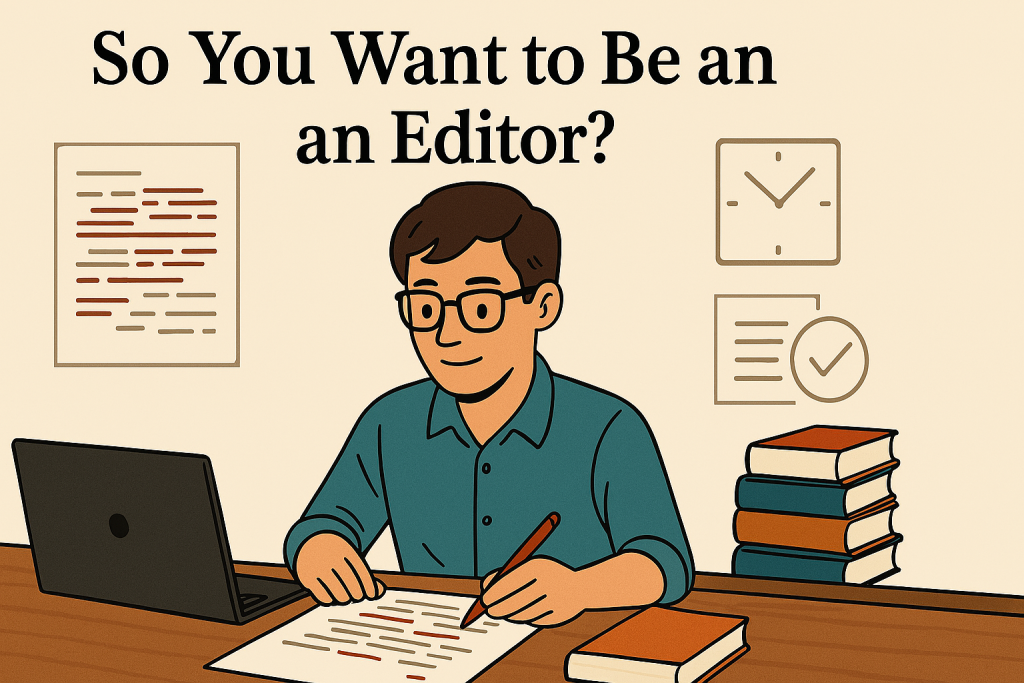
I was recently contacted by a student in an editing certification program with some thoughtful questions about the editing profession. Since I know many of my readers are writers who might be considering a similar path—or are just curious about what it’s like behind the editor’s desk—I thought I’d share my answers here as well.
1. What are three things every new editor should know?
- What are your rates going to be? Overcharging will drive away budget-conscious clients. Undercharging will be unsustainable. Use resources like the rate guides provided by the EFA or Northwest Editors Guild to give you a ballpark figure, then make your decision BEFORE you talk money with a potential client.
- How are you going to protect yourself as a freelancer? From contracts to timely, open communication, you should always have a defensive mindset when it comes to working with clients. Of course, nobody wants a working relationship to go south, but if it does, you want to be prepared.
- What types of work are you going to specialize in, and what types of work are you going to say no to? Editors who do a little of everything tend to become too generalized. Even if all you say is you only work in fiction. By deciding beforehand that you won’t do other types of work, you’re establishing a skillset and expertise that will improve the quality of your work and branding over time.
2. How did you find your first editing job?
Like so many things in my career, I kind of fell into it. I’d already been doing my own writing for several years when I was invited to teach a workshop for a writer’s conference. It sparked a passion for teaching creative writing, and I eventually took a position teaching creative writing at a continuing education program for a local college. When Covid hit, all my classes were cancelled, but by then I had a loyal following of students still interested in getting my help with their work. I leveraged my professional accomplishments as both an author and a creative writing instructor to join the Northwest Editors Guild and began editing my students’ manuscripts. I’ve been at it ever since.
3. Do you have any tips or tricks when it comes to finding and retaining new clients?
The best way to find new clients for most editors is to network with other editors. Editing is intensive, specialized work, and good editors often have a blocked-out schedule and too many requests to handle on their own. By getting to know other editors and presenting yourself as professional and collaborative, you’ll be more likely to get referrals from other editors. Also, if you ever get a potential quality client that isn’t a great fit for you either because of scheduling or the type of work, referring them to a specific editor you want to support is an excellent way to get similar gestures in the future.
4. What are three things that helped you build your editing business?
- Retaining clients. As with all business, it’s easier to sell again to the same customer than to find a new one. I’ve worked hard to develop loyalty in my customers by being skilled, timely, and personable.
- Being adaptable. While I’m careful not to compromise my safety as a freelancer or professional standards of the quality of my work, I’m constantly looking for ways to adjust my services and pay structures to better align with my clients’ needs.
- Saying no. Running a business requires knowing your limitations and protecting your needs. Whether it’s turning down a job offer because it’s not in my wheelhouse or refusing to give out freebies to new clients, I’ve worked hard to gain a tolerance for the uncomfortable necessity of having to occasionally tell someone no.
5. I want to be a developmental editor specializing in genre fiction, namely horror, sci-fi, and fantasy. Do you have any advice that might help me make that dream a reality?
Aside from everything I’ve already said, my only additional advice would be to caution against specializing too narrowly by genre at the beginning. Unless it’s something that fundamentally changes the nature of the editing (like children’s picture books, for example), focusing only on certain genres can limit your opportunities and reduce the range of perspectives you bring to your clients. A more balanced approach is to establish yourself first as a developmental editor of all genre fiction. Over time, as your client base grows, you can start leaning into horror, sci-fi, and fantasy as your primary focus. That way, you’ll still move toward your dream while keeping your business strong and sustainable.
Additional Thoughts
Editing can be a deeply rewarding career, but it’s also one that requires careful planning, boundaries, and constant growth. If you’re thinking about starting down this road, I hope these questions—and my answers—give you some useful perspective. Whether you’re a writer curious about the process or someone hoping to build an editing business of your own, know that there’s space for you in this field if you’re willing to keep learning, adapting, and saying yes to the right opportunities (and no to the wrong ones).